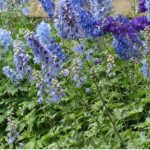Last updated on March 28th, 2022
Our site is reader supported, this means we may earn a small commission from Amazon and other affiliates when you buy through links on our site.
Winter is an incredibly challenging time for wildlife as temperatures drop and food becomes significantly harder to find. Birds who would normally consume insects have to find alternative foods while certain species will travel exceptionally far and adapt their foraging behaviours. You can help all of your local birds by providing an extra source of nutrition during the cold, winter months.
What to Feed Birds in Winter
What to feed the birds is truly contingent upon the type of birds you have in your area. Certain birds will be attracted to very specific foods while others will adapt what they consume based on what’s available. You can offer a wider variety of bird foods to maximize the number of birds you help.
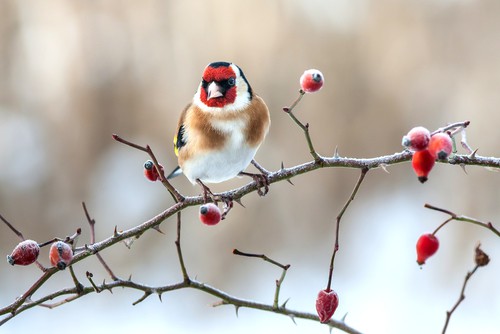
- Goldfinches typically eat smaller seeds.
- Greenfinches and Tits consume sunflower hearts.
- Sparrows, collared doves and wood pigeons eat large grains.
- Woodpeckers and starlings eat fat balls and peanuts in particular.
- Robins and thrushes like live food or mealworms.
- Waxwings will consume windfall fruit.
Obviously, there is a great range in the types of foods preferred and you should take it upon yourself to figure out what birds frequent your garden so that you can decide upon what foods are best suited for them.
- Feed freely in winter and during the breeding season. 100% natural high energy food without waste. The husks have been removed, so you only pay for the edible contents and there is much less mess around your eating area. Suitable for seed feeders, bird tables and ground feeding.
- Prized by goldfinches, bullfinches, nuthatches, robins, tits, blackbirds, sparrows, woodpeckers, brambles, and other birds.
- Packed in the UK by Britten & James
- These energy suet fat balls are enriched with sunflower seeds to attract more birds to your garden
- Use this food to attract Blackbird, Robin, House Sparrow, Long Tailed Tit, Chaffinch, Song Thrush, Blue Tit and Great Tit plus many more birds to your garden
- Suitable to be fed to birds all year round
- Can be fed from an energy ball feeder on a bird table or in a ground feeder
- High grade & aflatoxin tested, Extra Select Wild Bird Food prioritises top safety & nutrition for garden birds.
- Boasting 26% protein and 49% fat, these nuts for wild birds are ideal for robin bird food and more.
- Suitable for tables and as bird feeder peanuts, attracts a variety of birds and local wildlife.
- From nesting and mating season, to winter wild bird food, these bird nuts promote a lively garden year round.
- 1 kg Bag: Perfect starter pack of peanuts for birds, ideal small bird food for beginners starting out.
Where to feed birds during winter
Where birds receive their nutrients is almost as important as what nutrients you offer. If you have things like hanging bird feeders and bird tables you will probably see a lot of smaller birds and blue tits, but not as many dunnocks or wrens. This is simply because different birds have different feeding habits.
Try smearing fat or peanut mixtures into the crevices of branches or bark
In order to maximize your offerings, you can smear your fat or peanut mixtures into the crevices of branches or bark, specifically for birds that scavenge in trees like woodpeckers.
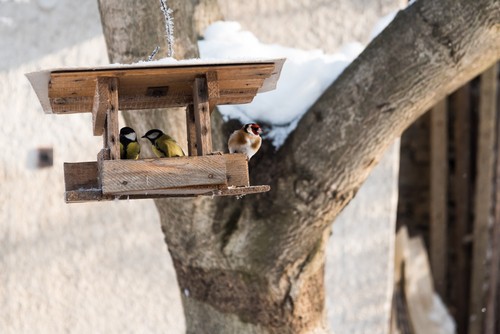
Hang bird feeders and remember to remove snow from feeders because this is when they often need it the most
You can still hang your feeders of course for the smaller birds but be sure to remove snow regularly as tinier birds will have a significantly harder time making their way through the snow in order to reach the food, even if it’s only a few centimetres deep.
It might be worth moving the feeders and tables around every now and then to help prevent certain predators (like Sparrowhawks or cats) from becoming far too familiar with the location of their prey. If you move these around a few times throughout the winter you can also help reduce the amount of mess or build-up which would otherwise accumulate in one area of your garden.
Additionally, you can sprinkle seeds and fat balls under shrubs for the ground-feeding birds.
Plants for birds in winter
You don’t have to limit yourself to things like mealworms or seeds. There are plenty of birds that will eat what nature provides. That being said, you can plant things like Rowan trees and cotoneaster shrubs that produce crops of berries throughout the winter. Mistle thrushes love these.
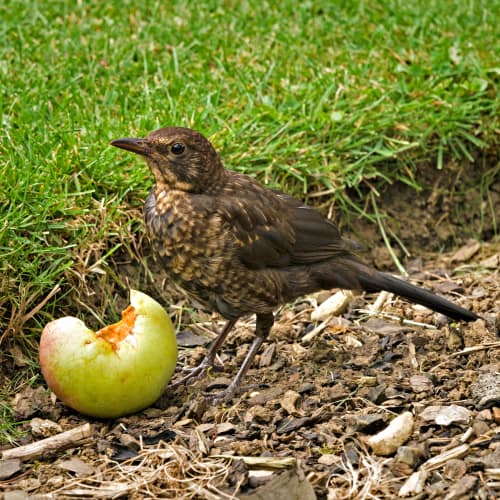
Leave fallen fruit from fruit trees rather than removing them
Cotoneaster berries are a great natural food source for blackbirds and thrushes. Blackbirds, as well as red wings, will appreciate any windfall apples. Fruit is particularly important for many birds so if you have fruit trees and shrubs you can leave the fallen fruit to give the birds something for winter.
Consider providing plants for hibernating insects that birds can feed on
Ivy is another useful climbing plant because the leaves provide a larder for wrens searching for hibernating insects.
Of course, never discount the use of nectar for smaller birds like blue tits. Early or late flowering ornamental shrubs can give berries and nectar in the winter, like the Mahonia.
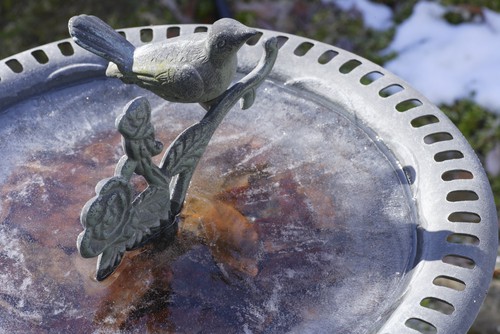
Provide water through bird baths
If you are going to plant trees for the local birds or maintain feeders of any kind, it might benefit the local birds for you to provide access to clean, fresh water. Wherever the birds access their food they should also have access to water. In order to counterbalance dry diets, especially for those who consume seeds like finches, you need to offer a regular source of water and when winter temperatures drop below freezing, the available sources become significantly limited. Remember to break the ice if the water freezes to ensure the birds still have access to water on frosty days.
You can also help by filling small containers with water when all other sources are frozen. In order to keep a small container melted you can even set it on top of two bricks underneath which you light a small tea light candle.
Don’t stop feeding once you start as this can mean the difference between life and death for birds in winter
Whatever you decide, once you start the process, don’t stop. It’s important that you keep up your regular habits of feeding birds because a sudden drop in food can be particularly detrimental to the birds who otherwise relied upon your food source.
If the food naturally or gradually runs out the visitors will soon adapt and start searching elsewhere so if you are unable to keep it up for one year, you plan on removing existing trees or fruit-bearing bushes, or you are moving, start to taper off the amount of food you make available so that the birds can make an adjustment. A sudden change can quite literally mean life or death, especially for smaller birds like tits.
Clean up
No good deed goes unpunished. When you decide to feed birds throughout the winter you will have to deal with the risk of unwanted diseases passing from one bird to another. You can help this by scrubbing the feeders regularly and rinsing away any droppings. Of primary importance is the removal of any mouldy or wet food.
Doing all of these things will go a long way toward providing the local birds with a reliable food source to get them through the colder, winter months. It also brings with it the fringe benefit of daily visits from the local bird population.
- Specially formulated to attract robins and other songbirds to your garden
- High in protein and enriched with mealworms
- This mix can be placed in a seed feeder but for a ideal chance of being eaten by a Robin use in a ground feeder or on a bird table as this is where robin's prefer to dine
- Contains calvita, a natural nutrient supplement containing calcium and vitamins
- This product comes in a resalable pack so you can keep the seed fresh once open
- Provides essential energy and nutrients for wild birds, perfect for winter feeding in all types of feeders. This blend supports birds’ increased energy needs during cold months, helping them maintain strength and warmth.
- Attracts a variety of bird species to your garden, enhancing your winter birdwatching experience. Enjoy the presence of robins, finches, and sparrows as they gather to feed from your feeders.
- Includes a mix of quality seeds for balanced nutrition, supporting birds through cold weather. Birds benefit from a complete diet in one mix, making it easier to sustain them during winter's challenges.
- Easy to use in hanging feeders, ground feeding stations, and bird tables, suitable for small and large gardens. Whether you have a spacious garden or cozy patio, this seed mix fits effortlessly into any setup.
- With 9 different ingredients, Winter Warmer contains 20% oil for that essential winter energy. Use in hanging seed feeders, ground feeders and on bird tables.
- Attracts a Variety of Birds: Suitable for attracting various species such as sparrows, finches, cardinals, and more. Nutrient-Rich: Provides essential nutrients like proteins, fats, and carbohydrates, promoting bird health. Convenient Feeding: Ideal for use in feeders, on the ground, or in bird tables, making it easy to feed birds in your garden. All-Season Use: Can be used year-round, providing birds with food during all seasons, especially in winter when natural food sources are scarce. Ethical Sourcing: Ethically sourced seeds, ensuring minimal environmental impact and support for sustainable agriculture.
- Energy Dense: The inclusion of sunflower hearts bird food recipes often lack, combined with diverse bird seeds, supports a wide variety of birds' needs.
- Rich Birdseed for Wild Birds: Packed with protein, perfect for growth and feather health. Providing nutritious wild bird food is essential for backyard bird care.
- Nut Free Bird Seed: Safe feeding for all species including species sensitive to bird nuts, all Extra Select Bird Food is made to the highest quality standards.
- Small Seeds: From canary seed to robin food, the inclusion of nyjer seed/niger seeds for birds and millet ensures even small-beaked species are cared for.
- 3kg: Providing a substantial supply for those looking to provide quality birdseed garden birds love, all year round.
- Wheat-Free Formula: Specifically developed without wheat fillers, offering a mess-free, wheat free wild bird seed
- Nutrient-Rich: High in protein and fat, this mix is ideal as bird seeds for small garden birds and other species
- All-Season Feed: Suitable for feeding wild birds throughout the year, from summer through harsh winter months
- Versatile Feeding: Best fed from a feeder or table, this wild bird feed is a great choice no matter your equipment
- Quality Ingredients: Contains a variety of seeds like sunflower hearts for birds, nyger, and peanut granules for a complete bird seed mix
Last update on 2025-07-02 / Affiliate links / Images from Amazon Product Advertising API









